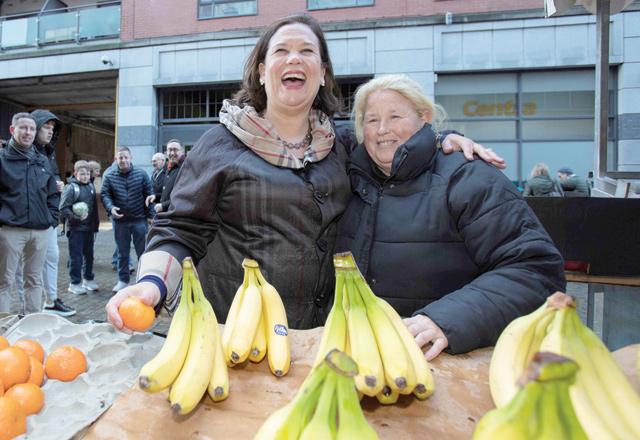You are here
Sinn Fein urges EU to back united Ireland bid after poll surge
By AFP - Feb 11,2020 - Last updated at Feb 13,2020

Irish republican Sinn Fein party leader Mary Lou McDonald (left) reacts as she meets with a fruit seller during a walk about in the centre of Dublin, Ireland, on Monday (AFP photo)
DUBLIN — Sinn Fein called on the European Union on Tuesday to back its bid for a united Ireland after a surge in support saw it become the second largest party in parliament.
The result from Saturday's election has shaken up the political landscape in the EU member state, with Sinn Fein — once shunned because of its links to IRA paramilitaries — also the second biggest party across the border in British-ruled Northern Ireland.
When vote counting finished in the early hours, the nationalist left-wing Sinn Fein had secured 37 of the 160 seats in the Dail, Ireland's lower house of parliament.
Centre-right party Fianna Fail was only one seat ahead with 38 while Prime Minister Leo Varadkar's Fine Gael took 35 — a result likely to topple the premier from office.
If a new government is to be formed when the Dail reconvenes on February 20, it must contain multiple parties and talks have already begun to thrash out a coalition.
Sinn Fein wants a central role in power after winning 24.5 per cent of first preferences in Ireland's single transferable vote system — the largest of any party.
Its leader Mary Lou McDonald has already talked to smaller left-wing parties to try to determine whether it is possible to form a government without the two main centre-right parties.
"I may well be the next taoiseach [prime minister]," she said on a walkabout in Dublin on Monday.
"Sinn Fein won the election, we won the popular vote... I'm very clear that people who came out and voted for Sinn Fein have voted for Sinn Fein to be in government."
Protracted talks
The surge in support for nationalist Sinn Fein, once regarded as the political wing of the IRA, broke the stranglehold of two-party politics in Ireland.
Its former leader Gerry Adams and other party representatives were even banned from the airwaves in the UK as violence raged over British rule in Northern Ireland over three decades to 1998.
But with two decades of peace and a new leader under McDonald, Sinn Fein's left-wing policies on tackling crises in housing and health found favour, especially younger voters.
McDonald said the two main parties — Fine Gael and Fianna Fail — were "in a state of denial" and had not listened to the voice of the people on pressing domestic issues.
Coalition talks are expected to be protracted and difficult, all the more so as Fine Gael and Fianna Fail have both ruled out any deal with Sinn Fein because of its past associations with the IRA.
Adams has long denied allegations he had a leadership role in the IRA, which waged a bloody campaign over UK-rule in Northern Ireland that saw more than 3,000 killed on all sides.
Border poll
Sinn Fein's flagship policy of a united Ireland is likely to figure prominently in whatever role it plays in government. It wants to call a referendum on the issue within five years.
McDonald herself called on the European Union to back the party's position.
"I think the European Union needs to take a stand in respect of Ireland in the same way that it supported the reunification of Germany," she told BBC television on Monday night.
"In the same way that it [Brussels] has a position on Cyprus, for example, and a positive approach to the reunification of that country. I think Ireland is no different."
McDonald described the partition of Ireland in 1921 — when six northern counties remained under British rule and the rest of the island became self-governing — as a "disaster".
"Reunification, reconciliation and good relationships with our next-door neighbours is the way forward," she added.
Former Irish prime minister Bertie Ahern said a border poll was now "inevitable".
But Democratic Unionist Party leader Arlene Foster disagreed.
She said that only Britain's Northern Ireland secretary can call a border poll "if it appears likely to secure a majority" in the province.
"No such circumstances exist," said Foster, who is also first minister of the devolved administration in Belfast, pointing to recent opinion polls that a majority were not in favour of such a vote.
Related Articles
DUBLIN — The leader of Ireland's Fianna Fail Party on Thursday said it was prepared to enter a coalition government with centre-right rival
DUBLIN — Irish Prime Minister Leo Varadkar was preparing to resign on Thursday but stay on as interim leader, with the country's three main
DUBLIN — Ireland's general election last Saturday saw Sinn Fein surge from fringe nationalist party with links to a paramilitary past, to be















